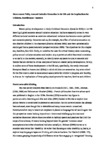Government Policy Around Inclusive Education in the UK and the Implications for Children, Families and Teachers
| dc.contributor.author | Done, E | |
| dc.date.accessioned | 2020-08-07T07:48:00Z | |
| dc.date.issued | 2020-06 | |
| dc.identifier.uri | http://hdl.handle.net/10026.1/16142 | |
| dc.description.abstract |
The relevance and value of a post-structuralist theoretical orientation when considering inclusion-related policy will be briefly explained, followed by the identification of recurrent themes in a post-structuralist analysis of UK policy developments. These themes include: a confused policy landscape that EY teachers must navigate, rights as a necessary but not sufficient condition of inclusion, and inclusion as an ethical (not economic) project that rejects deficit models of disability. Foucault (1982, p.778) insists on checking “the type of reality with which we are dealing” and, relatedly, the historical conditions of prevailing discursive fabrications to provide “historical awareness of our present circumstance”. Despite a longstanding inclusion agenda in the UK, academic performance continues to be prioritised with implications for teachers, families and children. An implicit binary of worthiness / unworthiness favours children perceived to potentially contribute to national economic capital. Consequently, the nature of caring has changed and teachers are under pressure to identify special needs and disabilities (SEND) as early as possible in a context of inadequate resourcing, external support and training, and competitive pressures. Children will leave EYE to enter an educational system which is test result driven and in which mental health is increasingly an issue. Parents may find they are liaising with schools where their child’s needs are not understood or cannot be adequately supported, or they may find schools refusing admission or experience pressure to move their child to a different setting. It is argued that a post-structuralist analysis permits recognition that a rhetoric of inclusion or inclusive education can serve to obscure tensions between economic, socio-political and ethical agendas. | |
| dc.language.iso | en | |
| dc.subject | Critical analysis | |
| dc.subject | Inclusion | |
| dc.subject | Policy | |
| dc.subject | Poststructuralism | |
| dc.title | Government Policy Around Inclusive Education in the UK and the Implications for Children, Families and Teachers | |
| dc.type | conference | |
| plymouth.date-start | 2020-03-04 | |
| plymouth.date-finish | 2020-03-05 | |
| plymouth.conference-name | International Inclusive ECE Conference in Turkey,.A joint initiative by UNICEF and Turkish Ministry of Education | |
| plymouth.journal | Engeli Olan Çocuklar İçin Kapsayıcı Erken Çocukluk Eğitimi Projesi | |
| plymouth.organisational-group | /Plymouth | |
| plymouth.organisational-group | /Plymouth/Faculty of Arts, Humanities and Business | |
| plymouth.organisational-group | /Plymouth/REF 2021 Researchers by UoA | |
| plymouth.organisational-group | /Plymouth/REF 2021 Researchers by UoA/UoA23 Education | |
| plymouth.organisational-group | /Plymouth/Users by role | |
| plymouth.organisational-group | /Plymouth/Users by role/Academics | |
| dcterms.dateAccepted | 2020-03-04 | |
| dc.rights.embargodate | 2023-11-21 | |
| rioxxterms.version | Accepted Manuscript | |
| rioxxterms.licenseref.uri | http://www.rioxx.net/licenses/all-rights-reserved | |
| rioxxterms.type | Conference Paper/Proceeding/Abstract |


